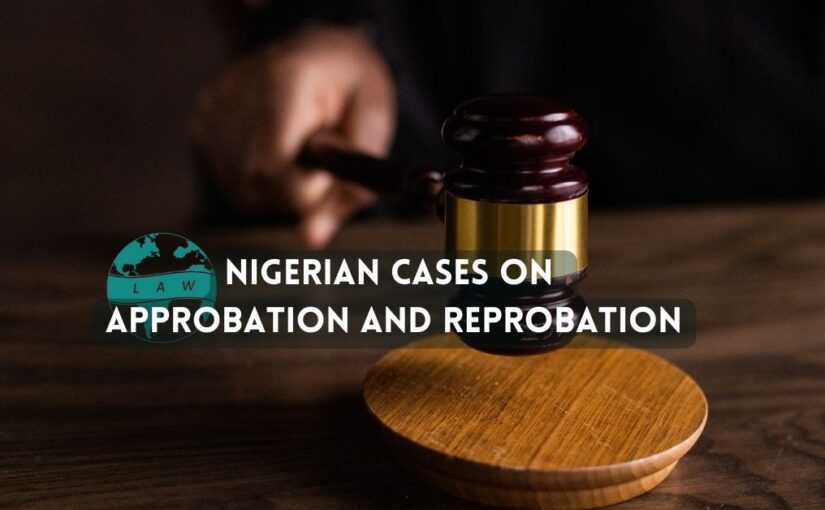Below are some rationes decidendi on Approbation and Reprobation from Nigerian cases. It is a settled principle of law in Nigeria that a party, counsel, witness or court is not allowed to approbate and reprobate simultaneously. That is to say, a party cannot approve and disapprove at the same time.
Meaning of Approbation and Reprobation
THOMAS WYATT AND SON (NORTH NIGERIA) LTD V. PLUMSTEAD INVESTMENT LIMITED (2019) 12 NWLR (Pt. 1687) 540 – Court of Appeal.
A person is not allowed in law to approbate and reprobate. As stated in the maxim: “quod approbo non reprobo” meaning “that which I approve, I cannot disapprove”.
EBEKE & ANOR v. EGWU & ORS (2020)LCN/14771(CA)
A party cannot be permitted to approbate and reprobate. They cannot on appeal, be permitted to canvass the opposite of the case freely stated by them at the trial.
NASKO & ANOR v. BELLO & ORS (2020) LPELR-52530(SC)
“…A party cannot approbate and reprobate at the same time. The Appellants cannot seek or ask for one thing at the lower Court and be asking for another incongruent, unparallel and impossible thing in this Court.
The Appellants had their prayer answered in the lower Court but are now seeking for a different proposition! One cannot eat his cake and have it back again. In other words, can the law permit him to blow hot and cold at the same time? Or, can he approbate and reprobate?”
Whether or not a party can Approbate and Reprobate
A.G. RIVERS STATE v. A.G. FEDERATION & ANOR (2022) LPELR-57708(SC)
“The parties agreed that this suit be heard on affidavit evidence. Agreements are meant to bind men of honour who reached and concurred in terms of the agreement.
It is in that regard that Section 169 of the Evidence Act, 2011 creates estoppel by conduct. In litigation, consistency is the rule. A party is not allowed to approbate and reprobate on one issue: COMPTROLLER GENERAL OF CUSTOMS & ORS v. GUSAU (2017) 4 SC (pt. Il) 123; (2017) 18 NWLR (pt. 1598) 363.”
B.B. APUGO & SONS LTD. V. ORTHOPAEDIC HOSPITALS MANAGEMENT BOARD (OHMB) (2016) 13 NWLR (Pt. 1529) 206 – Supreme Court
A party cannot approbate and reprobate on the same piece of evidence. In this case, the appellant tried unsuccessfully to persuade the trial court on the basis of exhibit J that it was an agent of Siemens AG.
Therefore, the appellant could not approbate and reprobate by arguing that the trial court ought not to have considered the document.
AJUWON & ORS v. GOVERNOR OF OYO STATE & ORS (2021)LCN/5134(SC)
Consistency is the rule of the game. A party is not allowed to approbate and reprobate on one issue: COMPTROLLER GENERAL OF CUSTOM & ORS v. GUSAU (2017) 4 SC (pt. II) 128; (2017) 18 NWLR (pt. 1598) 353 (SC).
No matter how powerful the client is or viable the brief, a counsel should always be worth his professional honour and pride to speak the truth and conduct the matter professionally. It is always right to follow the scripture and the teaching: what does it profit a man to gain the whole world and lose his soul?
Can Court, Counsel or Witness Approbate and Reprobate?
FRN v. IWEKA (2011) LPELR-9350(SC)
“This is in tandem with the settled principle of law that a court cannot approbate and reprobate at the same time.”
MUTTAKA BALA SULAIMAN v. ALL PROGRESSIVES CONGRESS (APC) & ORS (2023) 5 NWLR (Pt. 1877) 211 – Supreme Court
A litigant or counsel is not permitted to approbate and reprobate in the conduct of a case, even on appeal.
YUSUF V. OBASANJO (2005) 18 NWLR (Pt. 956) 96 – Court of Appeal
A witness is not entitled to approbate and reprobate.
See also:
– Nigerian cases on Breach of Contract
– Nigerian cases on Condition Precedent


Leave a Reply